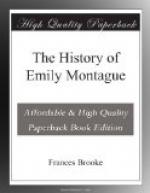LETTER 154.
To Mrs. Temple, Pall Mall.
Silleri, June 9.
I send this by your brother, who sails to-morrow.
Time, I hope, will reconcile me to his and Emily’s absence; but at present I cannot think of losing them without a dejection of mind which takes from me the very idea of pleasure.
I conjure you, my dear Lucy, to do every thing possible to facilitate their union; and remember, that to your request, and to Mrs. Rivers’s tranquillity, they have sacrificed every prospect they had of happiness.
I would say more; but my spirits are so affected, I am incapable of writing.
Love my sweet Emily, and let her not repent the generosity of her conduct.
Adieu! your affectionate
A.
Fermor.
LETTER 155.
To Mrs. Temple, Pall Mall.
Silleri, June 10, Evening.
My poor Rivers! I think I felt more from his going than even from Emily’s: whilst he was here, I seemed not quite to have lost her: I now feel doubly the loss of both.
He begged me to shew attention to Madame Des Roches, who he assured me merited my tenderest friendship; he wrote to her, and has left the letter open in my care: it is to thank her, in the most affectionate terms, for her politeness and friendship, as well to himself as to his Emily; and to offer her his best services in England in regard to her estate, part of which some people here have very ungenerously applied for a grant of, on pretence of its not being all settled according to the original conditions.
He owned to me, he felt some regret at leaving this amiable woman in Canada, and at the idea of never seeing her more.
I love him for this sensibility; and for his delicate attention to one whose disinterested affection for him most certainly deserves it.
Fitzgerald is below, he does all possible to console me for the loss of my friends; but indeed, Lucy, I feel their absence most severely.
I have an opportunity of sending your brother’s letter to Madame Des Roches, which I must not lose, as they are not very frequent: ’tis by a French gentleman who is now with my father.
Adieu! your faithful,
A.
Fermor.
Twelve at night.
We have been talking of your brother; I have been saying, there is nothing I so much admire in him as that tenderness of soul, and almost female sensibility, which is so uncommon in a sex, whose whole education tends to harden their hearts.
Fitzgerald admires his spirit, his understanding, his generosity, his courage, the warmth of his friendship.
My father his knowledge of the world; not that indiscriminate suspicion of mankind which is falsely so called; but that clearness of mental sight, and discerning faculty, which can distinguish virtue as well as vice, wherever it resides.




